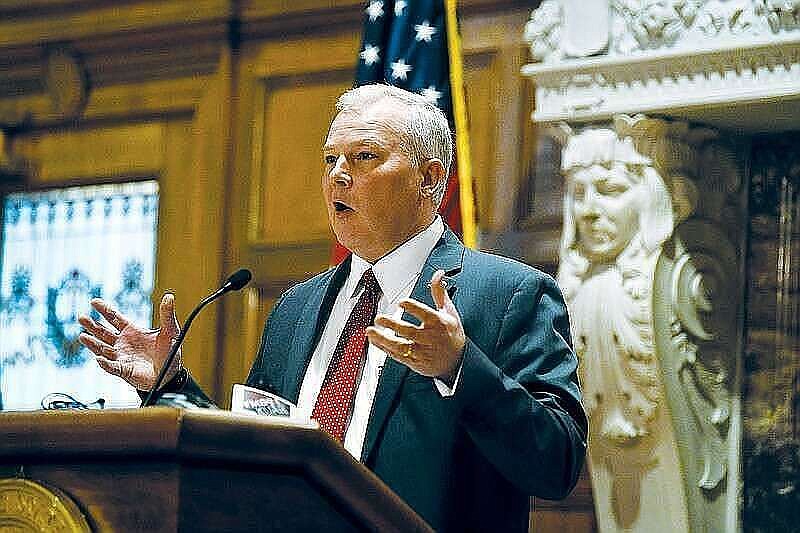Arkansas Attorney General Tim Griffin certified ballot language Tuesday for a proposed constitutional amendment that would overturn the state's ban on abortion.
Griffin's decision clears the way for the group behind the effort, Arkansans for Limited Government, to begin the signature collection process to get their proposed amendment on the November 2024 ballot.
The Arkansas Abortion Amendment proposes restricting the state's ability to limit abortions before 18 weeks after fertilization or in cases of rape, incest, fatal fetal anomaly or to protect the mother's life or from physical harm.
Currently, Arkansas law bans abortions except in cases of a medical emergency to save the life of the mother. The state's abortion ban took effect in June 2022 after the U.S. Supreme Court's landmark ruling in Dobb's v. Jackson Women's Health Organization that cleared the way for states to ban the procedure.
In a news release, Arkansans for Limited Government said Griffin's decision was "a crucial step forward in restoring reproductive freedom for Arkansans."
"Just yesterday, we acknowledged what would have been the 51st anniversary of Roe v. Wade. Today, we are one step closer to restoring the freedom that was taken from individuals when Roe v. Wade was overturned," Jim McHugh, treasurer of Arkansans for Limited Government, said in a statement. "We won't stop until Arkansans can use their voice at the ballot box in November."
Specifically, the proposed amendment says the state "shall not prohibit, penalize, delay, or restrict abortion services" in cases of rape, incest, fatal fetal anomaly or to protect a woman's life or "a physical disorder, physical illness, or physical injury." The amendment also says the state "shall not prohibit, penalize, delay, or restrict abortion services within 18 weeks of fertilization." The popular name for the proposal is the Arkansas Abortion Amendment of 2024.
To make the ballot, a constitutional amendment needs at least 90,704 verified signatures from registered voters, which has to be turned in to the secretary of state's office by July 5. Under Arkansas law, the attorney general has the authority to certify, reject or rewrite ballot language for a proposed amendment.
Griffin had twice rejected ballot language for the Arkansas Abortion Amendment, citing details in the proposal that were unclear or misleading. However, Griffin said the group's third submission compelled him to rewrite the amendment's popular name and ballot title with "minor changes" and to certify it.
"When reviewing proposed ballot initiatives, I follow an 80-year-old process. I am and have always been strongly pro-life, but the law does not allow me to consider my own personal views," Griffin said in a statement. "I am guided by the law and the law alone. I routinely certify proposals I personally oppose. Conversely, I routinely reject proposals I personally support."
However, even with Griffin's approval, the proposed amendment could face legal challenges.
"You should be aware that experience has shown a correlation between the length and complexity of initiated measures and their susceptibility to a successful ballot-title challenge," Griffin wrote in his opinion. "Any ambiguity in the text of a measure could lead to a successful court challenge."
Arkansas is one of 14 states that bans abortion, according to the Guttmacher Institute. So far, since the U.S. Supreme Court decision in June 2022, several states have taken up ballot initiatives on abortion, with those favoring legal abortions winning referendums on the issue across the country.
Republican politicians often refer to Arkansas as the most pro-life state, citing the state's strict ban on abortions as proof of their commitment to the issue. Republican super-majorities in the state legislature have meant strong resistance to proposed changes in the state's current abortion law.
A proposed bill to include an exception for lethal fetal abnormalities in the state's abortion ban failed to make it out of committee during last year's legislative session. Also, in the last session, lawmakers passed a law authorizing the secretary of state to make plans for a "monument to the unborn."
Jerry Cox, president of the Family Council, a conservative Christian group that lobbied for the state's abortion ban, released a statement shortly after Griffin's decision to certify the amendment warning that the amendment would make the state "powerless" in stopping the procedure.
"This is a radical amendment legalizing abortion in a way Arkansas has never seen before," Cox said in a news release. "It writes abortion into the Arkansas Constitution. It erases virtually all of Arkansas' pro-life laws, and it allows abortion on demand without restriction through the first eighteen weeks of pregnancy."
The Arkansas Poll, an annual voter survey conducted by the University of Arkansas, Fayetteville, shows Arkansans are deeply divided on abortion. According to the poll, which was released in October, 29% of those surveyed favored laws to make it more difficult for a woman to get an abortion, while 25% favored no change to the state's abortion law. In contrast, 38% said they favored laws to make it easier for a woman to get an abortion, while 8% said they weren't sure.
Arkansans for Limited Government said it will start its signature collection effort Sunday at a rally in Fayetteville, the beginning of the next step in the amendment process.
